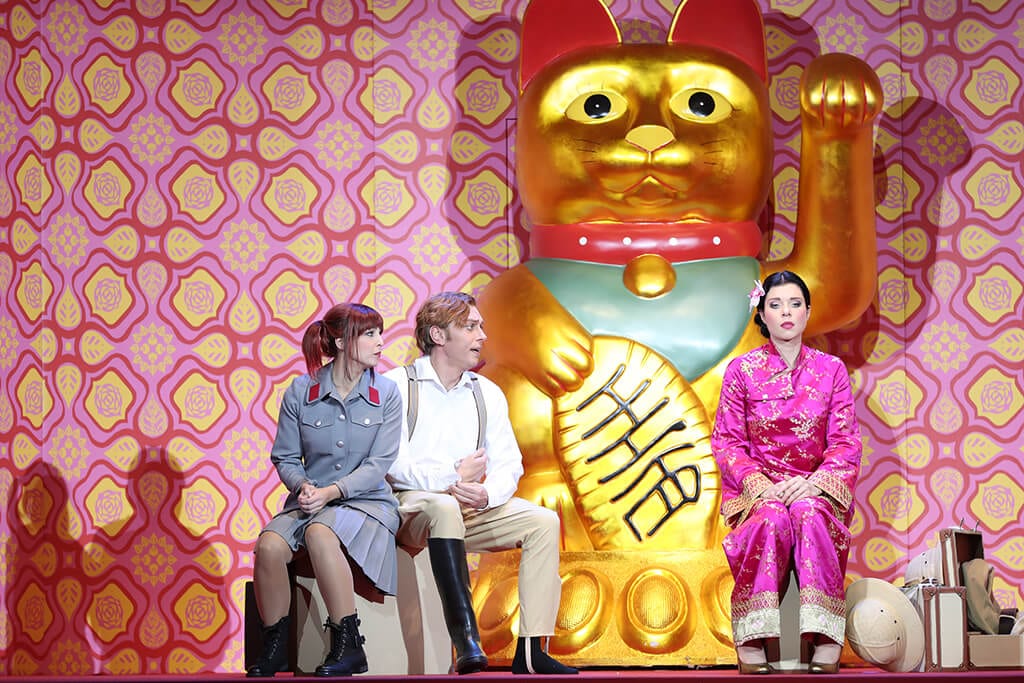The clash of cultures and the conflict potential often occuring when different cultural systems and ways of thinking meet has become a hot topic that is currently being talked about all over the world. Franz Lehar`s operetta Das Land des Lächelns (The land of smiles and laughter) points out exactly the challenge mankind is constantly facing, not only in times of a worldwide refugee crisis.
Having had its world premiere in 1929, the piece has become one of the most popular ones since then. Sung by Richard Tauber, who embodied the male main role of Sou-Chong at the world premiere, the aria “Dein ist mein ganzes Herz” gained popularity and fame very quickly and is certainly amongst the best-known arias for tenors.
The story is as follows: Sou-Chong, a Chinese prince ambassador in Vienna and Lisa, an Austrian, fall in love with each other. When Sou-Chong gets proclaimed the prime minister of China, Lisa decides to follow him. But as she tries to fit into the Chinese society, she painfully has to recognise that Sou-Chong’s world obviously does not give her any chance to integrate. Furthermore, she denies to accept some of Sou-Chong`s governmental and traditional duties – her husband`s marriage to four more women, for example. Disappointed, she starts working out a plan to escape the Chinese world with her best friend and former (or is it current?) lover Gustl, as Sou-Chong slowly begins to realize that he will have to let Lisa go.
Director Aron Stiehl chose a very unusual and interesting way for the beginning. Since all of the cast members are from different countries (except that there are two South Korean male singers), they introduce themselves before the music starts – in German and their own languages. This way, e.g. Korean, Italian and Letvian get in touch with German, though the statement stays the same one – “My name is …, I am from … – A COMPLETELY DIFFERENT WORLD!”. Basically, this leads right up to the evening`s question – “How can one fit into a world where no one speaks my language, no one lives the way I do and no one shares my way of thinking?”. The director and his team (among others – set and costumes: Friedrich Eggert) try to show as much as they can of the complexity behind the alleged “superficiality” related to the art-form of “operetta”, which, in the case of Das Land des Lächelns, wholly absent. The national and personal identity is currently a particularly sensitive issue, as millions of people are on their way towards a “better future”, a “better” world – that is sometimes not better at all, in the end. The barriers language, behaviour and habits pose are particularly prominent in this production.
The singers all give their best to bring to life their very own interpretation of their roles. However, there definitely are two worth being pointed out in particular: firstly, Yujoong Kim, a South Korean tenor, who masters the challenge of (largely) singing and speaking in German (not his mother tongue). The promising young tenor manages a strong voice in the lower register as well as very well-hit top notes. Secondly, Amelia Scicolone, who already enthused Klagenfurt`s audience as Blonde in Mozart`s Entführung, delights with a sparkling, lightweight voice as the rebel “Mi”, Sou-Chong`s sister, with a big heart – she proves herself to be a supremely talented singer and actor in one.
Torn between two countries, two lovers and two lives, the role of Lisa is embodied by Margarita Vilsone. The Latvian soprano has a big voice, shining tops and breathtaking pianissimi, but sings and speaks very unclearly, which has a slight impact on her vocal performance. Erwin Belakowitsch sings and plays “Gustl” and spreads the typically Austrian operetta-charm. Furthermore, his acting skills convince the opening night`s audience, which he wins over from the very first moment he enters the stage. Jisang Ryu as Tschang captures the character`s impishness speaking and singing, while the ballet ensemble (choreography: Matthew Couvillion) is the driving force of the evening`s action. The Stadttheater Klagenfurt choir (Günther Wallner), as always, delivers an experienced and reliable performance and enthusiastically integrates in the director`s visions: for example, the inanimate, illiberal Chinese state that is shown.
Finally, there is Giedre Slekyte conducting the KSO, very concisely and energetically – however, the audience was not on fire. Some of the significant musical moments could have been presented as more meaningful. Anyway, the theatre`s orchestra was well attuned and very homogeneous.
All in all, a very entertaining evening that tries to pick up on some current events and societal developments.

